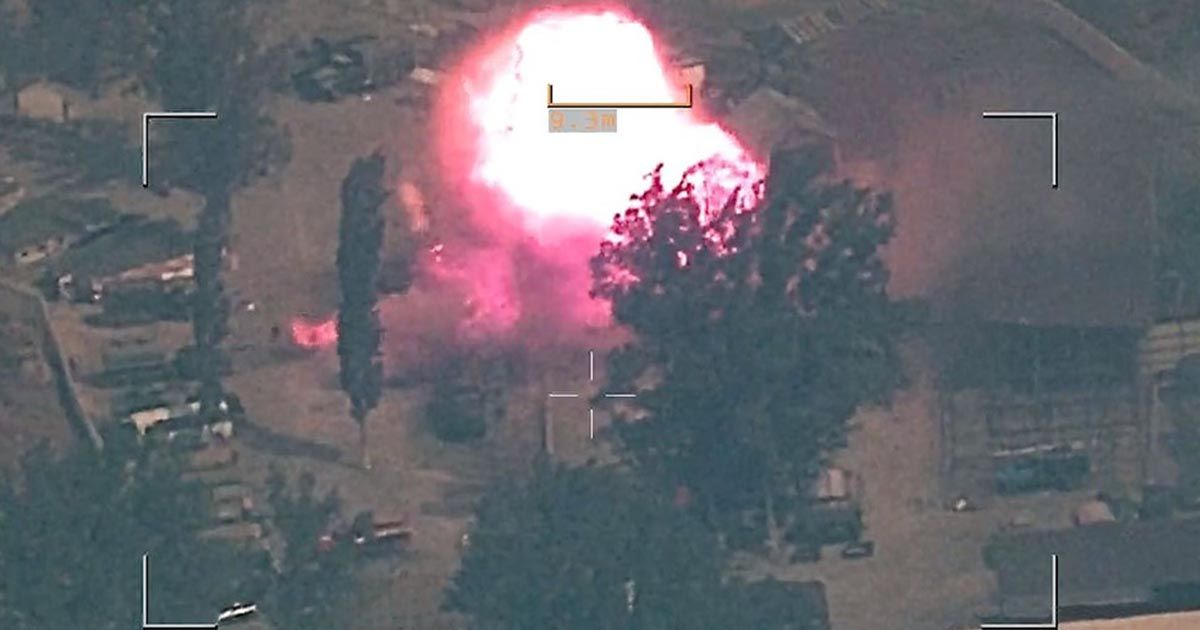Azerbaijan in charge of commanding heights in Karabakh

By Orkhan Amashov
The circumstances pertaining to the Russian peacekeepers temporarily stationed in Karabakh may be shrouded in obscurity, and Article 4 of the 10 November ceasefire deal may have not been fully implemented, but Azerbaijan has its design being carefully and, when the necessity arises, very swiftly implemented.
The recent early August escalation is a testament to Baku’s resolve not to shrink from the duty of effectively neutralising the remnants of the illegal Armenian formations that, contrary to the aforementioned provision of the trilateral declaration, remain present in Karabakh. The meaning of Article 4 could be disputed, but Azerbaijan has a clear view that the Russian contingent’s deployment in the area should have happened concurrently with the withdrawal of the separatist forces.
Any future escalation, which can by no means be overruled, will be defined by two sets of circumstances. Firstly, Azerbaijan’s decisiveness in counteracting the separatists bordering on the zone under the temporary responsibility of the Russian contingent will be critical. The March advance to the Farrukh Plateau was a clear indication of Baku’s ‘no-nonsense’ approach, only reinforced by the recent escalation.
There is also the question of how the Russian peacekeepers will react. Given that their mandate does not explicitly prescribe any mode of action, it will rather be decided on certain diplomatically agreed, yet publicly muted, understanding achieved on the Baku-Moscow front. The Kremlin’s preoccupation with Ukraine may give rise to the assumption that it will be accommodating towards Baku’s anti-terrorist operations.
There is no equality of arms between the Azerbaijan Armed Forces and the separatist remnants. Baku’s Operation Retribution, which followed Azerbaijani serviceman Anar Kazimov’s death, saw the employment of new generation warfare in the form of the ruthlessly effective application of network-centric combat actions. Drone operators, flawlessly supported by ground units, paved the way for Azerbaijan to regain control over the strategically vital heights of the Karabakh mountain range in a single day, stretching around 100 km from north to south.
Now, Baku’s military positions in Karabakh have significantly improved. For all the illegal separatists' residual 'luxury' of finding refuge within the area controlled by the Russian contingent, the Azerbaijani Army is in complete charge of the strategic heights of Buzluq, Qirxqiz, Uchdik, Saribaba, and Lachin Dag, forming the line of control points, enabling it to keep a sharp eye over the adjacent territory and main road infrastructure on both sides of the ridge.
Having safely positioned itself along the mountain range of the western side of the Karabakh Economic Region, Baku is now able to control the commanding heights overseeing Khankandi.
The Armenian argument is that Azerbaijan is seeking two interrelated objectives, namely, to achieve a large exodus of the Armenian population from the region, and secondly, to create favourable conditions for the withdrawal of the Russian contingent. It is true that Baku has no interest in extending the peacekeepers’ presence in Karabakh, and strictly views their situation as temporary.
However, the first element is rather contrived, as Azerbaijan distinguishes between the remnants of the so-called illegal ‘NKR’ and the Armenian population. The former is outside the legal space and should have already been negated in Karabakh. The latter, however, constitutes citizens of the Republic of Azerbaijan, which Baku views as being within its constitutional framework.
Another discernible line in the rhetoric employed by Yerevan is to present the post-escalation scene as representative of the Azerbaijani-Russian plot against it. Yet the truth of the matter is that the alternative route bypassing the city of Lachin has its firm foundation in the ceasefire deal and the Armenian recalcitrance was bound to backfire.
When I asked H. E. Richard Kauzlarich, former US Ambassador to Azerbaijan, about the August escalation, he attributed it to the lack of a properly constructed peace process. There is some undeniable truth in his suggestion. The 10 November document, for all its historic significance, was not a peace deal, and any so-called ‘peace’ accompanied by the uncertain legal status of the Russian ‘peacekeepers’ exacerbates the complexity of the whole situation.
There is an interstate normalisation agenda, which does not have Karabakh itself at its core. Nevertheless, there is a logic emanating from the trilateral declaration which mandates the gradual resumption of full de facto Azerbaijani control over the region and the incorporation of the Armenian population into Azerbaijani citizenry, with their security and rights constitutionally protected.
Although during certain phases of the post-war process, Armenian Prime Minister Nikol Pashinyan has shown feigned signs of submission to this logic, his overall policy, however, in large chunks, seems to favour winning time and procrastinating until the circumstances on the ground miraculously change into a mode of pro-Armenian fertility to rectify the 2020 deal. This leaves Azerbaijan with an option of putting into practice a measured assertive policy, exerting pressure on Yerevan, forcing its hand through various modes.
Baku is expected to pursue the line of 'neutralisation' of whatever remains of the former, illegal and misbegotten ‘NKR’, actively working towards the opening of communications, with a heavy focus on the Zangazur project, and accelerating the process leading to a comprehensive peace treaty. An opponent's goodwill is never taken for granted or naively expected, it is usually squeezed out of them by virtue of an overwhelming pythonesque pressure, ensuring that they can follow their conscience on the foundations of the mores of cold sober reasoning.
--
Follow us on Twitter @AzerNewsAz
Here we are to serve you with news right now. It does not cost much, but worth your attention.
Choose to support open, independent, quality journalism and subscribe on a monthly basis.
By subscribing to our online newspaper, you can have full digital access to all news, analysis, and much more.
You can also follow AzerNEWS on Twitter @AzerNewsAz or Facebook @AzerNewsNewspaper
Thank you!
